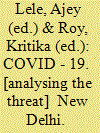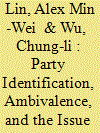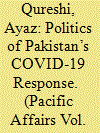| Srl | Item |
| 1 |
ID:
171463


|
|
|
|
|
| Publication |
New Delhi, Pentagon Press, 2020.
|
| Description |
xxvii, 426p.hbk
|
| Standard Number |
9789390095070
|
|
|
|
|
|
|
|
|
|
|
|
Copies: C:1/I:0,R:0,Q:0
Circulation
| Accession# | Call# | Current Location | Status | Policy | Location |
| 059874 | 303.485/LEL 059874 | Main | On Shelf | General | |
|
|
|
|
| 2 |
ID:
189473


|
|
|
|
|
| Summary/Abstract |
After the Covid-19 pandemic began to wreak havoc around the world in January 2020, Taiwan managed to stay mostly Covid-free due to swift and efficient action taken by the government to contain the outbreak. However, after the country experienced its first significant wave of domestically transmitted cases in May 2021, vaccines became a highly salient issue because Taiwan did not have enough doses to immunize all its citizens. In this study, we investigate how Taiwanese appraise the government’s overall efforts to acquire vaccines. We hypothesize that, apart from a partisan divergence of opinions, some citizens would hold ambivalent attitudes toward the way the government handled the vaccine procurement process. Results from multivariate regression analysis indicate that the effect of party identification on evaluations of government is conditionally dependent on citizens’ level of ambivalence. Specifically, increased ambivalence offsets the strong effect of party affiliation on government evaluation, especially for political independents and supporters of opposition parties.
|
|
|
|
|
|
|
|
|
|
|
|
|
|
|
|
| 3 |
ID:
187420


|
|
|
|
|
| Summary/Abstract |
This paper takes a “state-in society” approach to understanding the evolution of Pakistan’s COVID-19 response, which was laid claim to and contested by multiple agencies within and adjacent to the state, and by multiple levels of government. The capacity of the health system of Pakistan was already overstretched by the needs of its population but in recent years it has been hamstrung by ongoing protests by the medical community concerning the privatization of public-sector hospitals, to which were added protests over the lack of personal protective equipment in the public sector. These protests resulted in frequent closures of outpatient departments at major hospitals. When the government announced a relief package to mitigate the effects of COVID-19, traders and big businesses lobbied the government to obtain the lion’s share in the form of concessions such as loan deferments and tax refunds. The government touted the unconditional cash grants program but the cash for the poor could not be disbursed effectively due to the absence of local governments at the grassroots level. As an appropriate response to the pandemic, especially in relation to the lockdown policies, was contested and negotiated among multiple actors in the Pakistani state and society, the Pakistani military emerged as a dominant force in this “field of power.”1 In this paper, I present an account of Pakistan’s response to COVID-19 as it evolved in 2020 and discuss the implications for democratic culture in Pakistan.
|
|
|
|
|
|
|
|
|
|
|
|
|
|
|
|